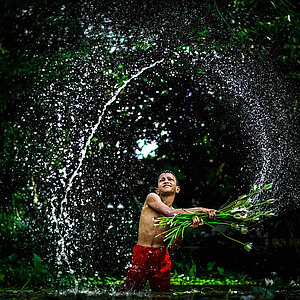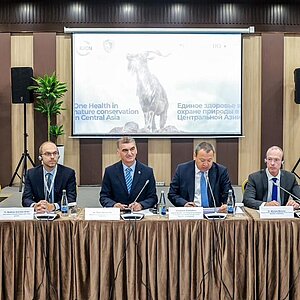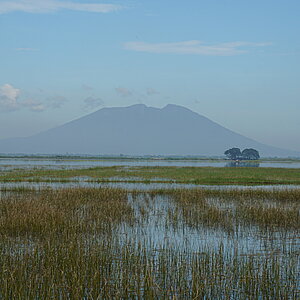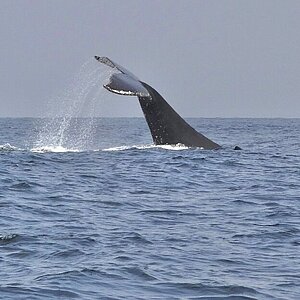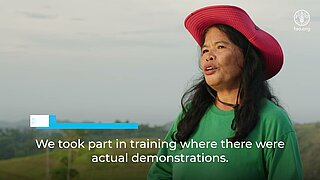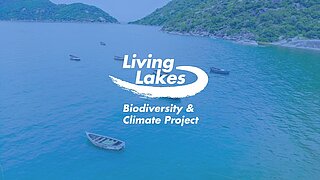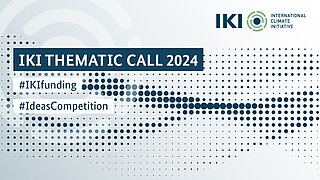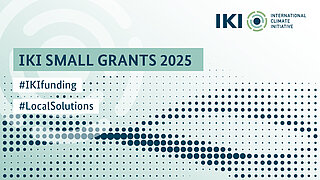CBD COP 16
The International Climate Initiative (IKI) at the CBD COP 16 in Cali, Colombia (21 October to 1 November 2024)
The 16th Conference of the Parties (COP) to the Convention on Biological Diversity (CBD COP 16) marks a decisive moment in global efforts to implement the ambitious targets of the Kunming-Montreal Global Biodiversity Framework and therefore meet the challenges of the biodiversity crisis.

Links
Important initiatives with IKI participation
Conference outcome
At CBD COP 16, which initially took place from 21 October 2024 to 1 November in Cali, Colombia, the international community took another, important step towards the conservation, sustainable use and restoration of nature. After several, sometimes lengthy, negotiating sessions, important decisions were taken to implement the Global Biodiversity Framework (GBF). These included key agreements to better integrate biodiversity conservation and climate change mitigation, and to strengthen the role of indigenous peoples and local communities.
The CBD COP 16 was successfully concluded in Rome on 27 February 2025. Among the most important resolutions adopted were review mechanisms and a monitoring framework to make progress in implementing national biodiversity strategies measurable. The participating countries also agreed on measures to enhance the mobilisation of resources for biodiversity conservation and to strengthen cooperation across international conventions.

In Cali, we achieved a truly significant milestone in nature conservation. This required hard work and tough negotiations. I particularly welcome the fact that the voice of indigenous peoples and local communities will be strengthened – as they play an exceptionally important role in global biodiversity conservation. The decisions on biodiversity and the climate crisis will better integrate climate change mitigation and biodiversity conservation in the future, through greater cooperation at the policy, planning and implementation levels. Steps are also being taken towards closer cooperation between the Intergovernmental Platform on Biodiversity and Ecosystem Services (IPBES) and the Intergovernmental Panel on Climate Change (IPCC), with greater coherence between conservation and climate action plans.
Key outcomes from CBD COP 16 – an overview
Indigenous peoples and local communities
The provisions of the GBF prioritise the role of indigenous peoples and local communities (IPLCs). Biodiversity in regions managed by indigenous peoples and local communities is in a demonstrably better condition than in other regions – including protected areas. As a result, elegates in Cali adopted a work programme that calls for a greater role for the traditional knowledge of indigenous peoples and local communities in future efforts to tackle the biodiversity and climate crises. A permanent body to strengthen the participation of IPLCs was also established.
Integrating climate change mitigation with biodiversity conservation
After the lack of consensus at CBD COP 15 in Montreal, positive decisions on biodiversity and climate were negotiated in Cali. Many parties to the GBF – including Germany – called for the greater integration of biodiversity and climate change mitigation at policy, planning and implementation levels. One example is the continued cooperation between the Intergovernmental Platform on Biodiversity and Ecosystem Services (IPBES) and the Intergovernmental Panel on Climate Change (IPCC). There are also plans to make better use of the synergies between the implementation of national biodiversity strategies and action plans (NBSAPs) and nationally determined contributions (NDCs). Under the UN conventions on biodiversity (CBD), climate change (UNFCCC) and combating desertification (UNCCD), opportunities for a common programme of work for all conventions and fostering greater cooperation and policy coherence will be reviewed by the date of the next Conference of the Parties (CBD COP 17) in two years.
Marine conservation
Significant progress was also made in marine conservation. After eight years of negotiations, a breakthrough was achieved in the scientific description of ecologically or biologically significant marine areas. In the future, there will be an improved and more efficient process for identifying biologically valuable marine areas that should be protected. This is not only relevant for CBD conferences but can also be used for the future identification of marine protected areas under the new UN Agreement on Marine Biodiversity of Areas beyond National Jurisdiction (BBNJ Agreement).
Achievements in implementation
With the GBF, the international community has set itself challenging and far-reaching targets. COP 16 was an important milestone for ambitious implementation. To ensure high quality, consistent reporting, the monitoring framework adopted at CBD COP 15 was amended to include additional elements.
Digital sequence information
The parties to the CBD have agreed on a new and innovative financial instrument, namely the establishment of a fund called the ‘Cali fund for the fair and equitable sharing of benefits from the use of digital sequence information’. In order to further the objectives of the Convention, a global fund has been set up to ensure that countries – especially megadiverse countries – benefit more from the use of their genetic resources.
Digital sequence information (DSI) refers to the genetic information of a living organism, represented as a coded sequence of letters and stored digitally in this format. This data is important for conducting basic research and for commercial applications, and can also provide economic benefits.

The IKI supports the implementation of the GBF targets
Alongside the official negotiations, the German Federal Government again once again demonstrated leadership in Cali. At the previous Conference (CBD COP 15) held two years ago, Germany and Colombia establish the NBSAPs (national biodiversity strategies and action plans) Accelerator Partnership, to support countries achieve in the rapid and ambitious implementation of the GBF. Supported by the International Climate Initiative (IKI), this partnership aims to facilitate countries’ access to technical and financial support tailored to their specific needs. The Partnership offers countries and organisations access to a comprehensive service (matchmaking mechanism) to find tailor-made solutions to their financial challenges or knowledge gaps.
At this year’s CBD COP 16, Germany launched the core of the matchmaking mechanism, with the Federal Ministry for the Environment, Nature Conservation, Nuclear Safety and Consumer Protection (BMUV) providing a further EUR 15 million via the IKI.
In addition to this partnership, Germany directly supports several partner countries in the implementation of their national biodiversity strategies. In this context, the IKI plays a key role in the German support provided.
Working together on biodiversity conservation and climate action
The climate and biodiversity are inseparably interlinked: climate change threatens biodiversity in many different ways – both by changing habitats and by threatening species directly as a result of extreme weather events. At the same time, the loss of biodiversity means that ecosystems are becoming less resilient to the impacts of climate change.
The IKI therefore funds projects that work to conserve biodiversity while also accelerating adaptation to the impacts of climate change and the mitigation of greenhouse gas emissions. Measures funded in this way include the restoration of ecosystems that act as carbon sinks while simultaneously serving as habitats for endangered species and the funding of sustainable land use that not only supports the conservation of biodiversity but is also able to reduce greenhouse gas emissions.
Nature-based solutions (NbS) are of fundamental importance here . These solutions – which include natural spaces as well as areas used for human settlements or agriculture – systematically counteract the ecological double crisis of climate change and loss of biodiversity.

Nature-based solutions can be placed into various categories, depending on the primary benefit that the NbS aims to achieve. If they primarily serve adaptation to the impacts of climate change, the term used is ‘NbS for adaptation’ or ecosystem-based adaptation (EbA). One example of this is the protection and afforestation of mangrove forests along coastal sections endangered by extreme weather events. If the focus is on the mitigation of greenhouse gas emissions, the term ‘NbS for climate change mitigation’ is used instead. This is the case for solutions aimed at forest and landscape restoration or the rewetting of peatlands and wetlands for carbon sequestration, for example.
These integrative approaches are a decisive step towards achieving the targets of the Global Biodiversity Framework and the Paris Agreement. By providing its support here, the IKI is also fostering sustainable development in its partner countries. These synergies are decisive for the success of CBD COP 16 and beyond.
Selected IKI project
Securing biodiversity finance
The GBF estimates the global financing gap for measures to conserve biodiversity to be around USD 700 million annually. As public funds cannot be stretched to close this gap, this means that far greater participation is needed from the private sector in particular.
The GBF aims to secure the provisioning and accessibility of implementation funding for all signatory parties – especially developing and emerging countries and small island developing states (SIDS) – and to harmonise financial flows with the targets as set out by the GBF. The signatory parties to the GBF only have a few years left to achieve the 2030 GBF targets. Accordingly, financing from all sources is required, which is to be provided via a number of financing mechanisms, including the Global Biodiversity Framework Fund (GBFF) that was established in 2023.
The IKI uses a broad and varied spectrum of approaches to help its partner countries as they capitalise and mobilise resources for biodiversity conservation. These approaches include the marketing of biodiversity-friendly products, the integration of biodiversity into the private and financial sectors as well as the promotion of ecotourism.
Supporting indigenous peoples and local communities
Many indigenous peoples and local communities (IPLCs) have been acting as environmental guardians for centuries. The role played by IPLCs, with their traditional knowledge and the methods they use to protect and manage their territories, is now increasingly recognised. Efforts to halt the extinction of species and restore ecosystems will be successful only if IPLCs play a key role both in conservation and in the sustainable use of biodiversity.
Target 22 of the GBF envisages ensuring full, equitable, inclusive, effective and gender-responsive representation and participation in decision-making related to biodiversity, while requiring respect for cultures and their rights over lands, territories, resources, and traditional knowledge.

Germany is calling for IPLCs to have co-determination rights in conservation at national and international level, and for the safeguarding of their land rights and usage rights. Support that the IKI offers here includes strengthening the IPLCs position as key stakeholders in the management of protected areas in the ‘territories and areas conserved by indigenous peoples and local communities’ (ICCAs), which cover around 32 percent of the global land surface while simultaneously making up at least 36 percent of the most biologically diverse regions of our planet.
Another important aspect here is access to genetic resources and the sharing of the benefits derived from their use, as well as the monitoring of compliance with these kinds of regulations (access and benefit sharing, ABS). IPLCs should participate more strongly in decision-making regarding access to and use of genetic resources, and should be included in benefit sharing. The Nagoya Protocol is the most important regulatory instrument governing access to genetic resources and the fair sharing of benefits within the context of the CBD. A total of 140 parties have already signed or ratified the Nagoya Protocol. Other countries are expected to sign the Protocol in the run-up to COP 16 in Cali.
Delegations of the BMUV visited IKI projects
On the fringes of CBD COP 16, delegations from the Federal Ministry for the Environment, Nature Conservation, Nuclear Safety and Consumer Protection (BMUV) took the opportunity to visit IKI projects in Colombia. Federal Environment Minister Steffi Lemke travelled together with the German Ambassador to Colombia, Martina Klumpp, to the project 'Protected areas and peace in Colombia', where they met with project staff and visited project activities.
The Parliamentary State Secretary of the BMUV, Jan-Niklas Gesenhues, was also able to gain an insight into IKI's project work. He visited the project 'Implementation and Financing of Ecosystem-based Adaptation (EbA) by the Food and Agriculture Sector to reduce climate risk and environmental impacts in Latin America' and learned about ecosystem-based adaptation measures in Colombia.


Overview: IKI-related events at the CBD COP 16
This calendar provides an overview of IKI-related events taking place at CBD COP 16. The calendar is constantly updated and does not claim to be exhaustive. The organisers are responsible for the information provided.
-
Monday 21 October 2024
Proyectos regionales en el Pacífico oriental tropical y sudeste y su contribución a las metas del Marco Global de Biodiversidad Kunming-Montreal
Key strategies necessary to meet MGB-KM goals will be discussed, highlighting innovative approaches in governance, restoration, and others.
10/21/2024 - On site in Cali, Colombia Details Proyectos regionales en el Pacífico oriental tropical y sudeste y su contribución a las metas del Marco Global de Biodiversidad Kunming-Montreal -
Monday 21 October 2024
Conectividad en el Pacífico Oriental: patrimonio de la región, beneficio para el mundo
Discuss opportunities for building or strengthening a regional connectivity vision with the vision of the “Pacific System”
10/21/2024 - On site in Cali, Colombia Details Conectividad en el Pacífico Oriental: patrimonio de la región, beneficio para el mundo -
Tuesday 22 October 2024
NBSAP Day
NBSAP Day is designed to bring together a diverse array of stakeholders to showcase progress, share lessons learned, and explore innovative solutions…
-
Wednesday 23 October 2024
Innovative Knowledge Management for scaling practical solutions: Leveraging PANORAMA Global Biodiversity Framework Implementation
This event will feature case studies and experiences, showcasing how PANORAMA's approach is bridging local solutions with global policy frameworks and…
10/23/2024 - On site in Cali, Colombia Details Innovative Knowledge Management for scaling practical solutions: Leveraging PANORAMA Global Biodiversity Framework Implementation -
Wednesday 23 October 2024
IKI networking event at the CBD COP16
To promote mutual acquaintance and the exchange of experiences between the projects, the IKI invites implementing organisations to a networking…
IKI funding
The link has been copied to the clipboard









